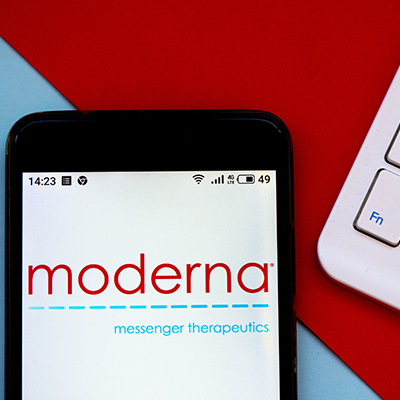December 16, 2020 -- Moderna has published information supporting a 94.1% efficacy rate for its messenger RNA (mRNA) COVID-19 vaccine, mRNA-1273. The company made the data available ahead of a December 17 committee meeting at the U.S. Food and Drug Administration (FDA) to review the vaccine candidate.
The mRNA-1273 vaccine candidate is scheduled to be reviewed on December 17 by the FDA's Vaccines and Related Biological Products Advisory Committee (VRBPAC), the same committee that reviewed and signed off on the BNT162b2 vaccine from Pfizer and BioNTech. That vaccine candidate was granted emergency use authorization (EUA) by the FDA a few days later.
Moderna's mRNA-1273 vaccine candidate is based on the SARS-CoV-2 spike glycoprotein antigen encoded by RNA and formulated in lipid nanoparticles. The vaccine's efficacy, immunogenicity, and safety were evaluated in collaboration with the U.S. National Institutes of Health (NIH), the U.S. Biomedical Advanced Research Administration (BARDA), and Operation Warp Speed. Late-stage clinical protocols for the vaccine and statistical analysis plans were designed in accordance with FDA guidelines.
Moderna filed for an EUA on November 30 for use of the vaccine in the prevention of COVID-19 caused by the SARS-CoV-2 virus in individuals 18 years of age and older, administered as two doses, 100 µg each, administered one month apart.
Using sponsor-supplied briefing documents, members of VRBPAC will discuss if the potential benefits of the Moderna vaccine candidate outweigh the known and potential risks.
mRNA-1723 immunogenicity
Data from a phase I clinical study helped determine the dose levels used in the phase II and III studies, which are still all ongoing in the U.S. Immunogenicity results from the phase I trial indicated that the vaccine induces neutralizing antibodies in all patients after the second dose of the vaccine.
The predominant T-cell response elicited by the vaccine was CD4+ T cells, mostly of the Th-1 phenotype. The phase II study supported the selection of the two-dose regimen at 100 µg each for the phase III clinical trial.
mRNA-1273 efficacy
The phase III trial, a randomized, placebo-controlled study, is evaluating the efficacy, safety, and immunogenicity of mRNA-1273 in adults over 18 years of age and met its primary efficacy end point. A vaccine efficacy of 94.1% was observed from a total of 11 confirmed cases of COVID-19 in the mRNA group and 185 in the placebo group at least 14 days after administration of the second vaccine dose.
Moreover, the company found that there were no cases of severe COVID-19 in the vaccine group within 14 days of the second injection, as compared to 30 severe cases in the placebo group.
Of note, the primary end point was symptomatic COVID-19 defined by at least two common systemic symptoms (fever, chills, myalgia, headache, and sore throat) or at least one specific respiratory sign/symptom or pneumonia, in combination with documentation of at least one nasopharyngeal swab, nasal swab, or saliva sample that was positive for the virus as determined by reverse transcription polymerase chain reaction (RT-PCR).
In an addendum document, Moderna submitted data in support of the vaccine's ability to protect against asymptomatic infection. The company indicated nasopharyngeal swabs for SARS-CoV-2 were collected prior to both dose 1 and dose 2 of the vaccine. The positive test results at the predose 2 time point were compared to baseline seronegative participants to demonstrate potential prevention of asymptomatic infection. Fourteen participants in the vaccine group compared to 38 in the placebo group had evidence of SARS-CoV-2 infection at the second dose without evidence of COVID-19 symptoms. These data might suggest that the vaccine offers some protection against asymptomatic infection after the first dose.
mRNA-1273 safety
The briefing document reported that "mRNA-1273 demonstrated an acceptable tolerability profile with no significant safety concerns." Reactogenicity -- local and/or systemic adverse reactions -- were observed in a majority of participants in the mRNA-1273 group and generally increased after the second injection. Most adverse reactions were not serious; were characterized by pain at the injection site, fatigue, and headache; and were resolved within three days. The final interim analysis included safety data from participants for an average of 63 days (nine weeks).
The company reported 13 deaths in the study (six in the mRNA-1273 group and seven in the placebo group), all of which were determined to be unrelated to the investigational vaccine. Only one death in the placebo group was due to COVID-19.
As part of the discussion for the VRBPAC meeting, Moderna laid out its pharmacovigilance plan for the vaccine. Routine surveillance of all adults who received mRNA-1273 will be conducted during the entire EUA and postmarketing periods, through at least December 31, 2022, per the approved study protocol. All cases of COVID-19 will be entered into a global safety database
Do the benefits outweigh the risks?
According to the document, benefits of the mRNA-1273 vaccine include an observed vaccine efficacy rate of 94.1%, including prevention in target populations such as older adults and individuals with medical comorbidities. This information, along with supporting data regarding production of antibody titers and tolerability of the vaccine, points to its potential protective nature.
The company noted several risks to vaccine administration, including local and systemic adverse reactions in vaccine participants that were observed over the relatively short period of the phase III clinical study.
The VRBPAC meeting will be held on December 17 beginning at 9 a.m. EST. The committee is expected to give a recommendation to the agency on the issuance of an EUA to Moderna for mRNA-1273 for the prevention of COVID-19 in adults over the age of 18.
Do you have a unique perspective on your research related to vaccine or infectious disease research? Contact the editor today to learn more.
Copyright © 2020 scienceboard.net









